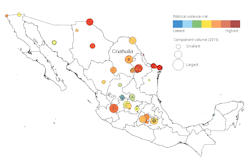
Consider that a theme running through the articles in this special edition is that we are all effectively the victims of our own success in accumulating vast stores of information, scattered throughout different systems, in different formats, and with different means of access. As one longtime observer of the engineering and knowledge management fields, Sheri Rhodine, points out in the Q&A starting on page 5, technical professionals are "drowning in information," and the problem is getting worse as systems and data expand exponentially within and outside our companies. We're paralyzed by the sheer volume of information.
The potential impact of this paralysis on revenue, profitability and brand reputation is significant, including direct and indirect procurement costs, lost engineering and research productivity, and problems that don't get solved before products go to market. The latter possibility, of course, creates tremendous risks—no CEO wants their company to wind up on the front page due to a critical product failure that opens up the door to ruinous financial liability or worse.
The good news is, companies are finding ways to overcome the barriers to success created by the information deluge, at least with regard to the kinds of information required by engineers, scientists and related professionals. As explained in the article "Unleashing Technical Talent," starting on page 7, a set of best practice strategies for technical knowledge management is emerging. It’s based on the experience of industry leaders, but applicable to a broad array of companies that are looking to arm their knowledge-driven professionals with tools to help them make faster and better decisions.
Diverse companies across different sectors are already successfully applying these strategies today to manage their knowledge challenges, as you will read in articles describing initiatives in the Energy sector ("Leveraging Knowledge...," page 11), Automotive ("Modernizing Quality...," page 13) and Aerospace ("Tapping the Unstructured Data...," page 15). These case studies demonstrate that bringing together an enterprise's most talented—and most highly paid—technical professionals with the right set of tools and processes can empower these innovators and problem-solvers to spend more time on their core competencies, doing what they are actually paid to do, rather than performing non-value-adding information searches.
A word of caution is warranted for companies looking to pursue a path toward better technical knowledge management. Kevin Alexander's article "The Clear Path to Effective Knowledge Management" (page 21), points out that if engineers and researchers have to spend inordinate amounts of time "tagging" content and ensuring that documents get filed in the "right" repository, they wind up "working for the system" instead of the system working for them. Companies need to ensure that their solution truly enables their staff rather than creates additional tasks or complexities that take them away from their core competencies.
At the end of the day, in an information-driven economy, knowledge will be power. But only for those organizations that are able to effectively mine true nuggets of knowledge inside and outside the enterprise. Put the right tools into the hands of your innovators and problem-solvers, allowing them to dig up those information nuggets quickly and connect them to other gems of insight, and you stand to open up infinite possibilities for progress – and profits.

















![Pros To Know 2026 [color]](https://img.sdcexec.com/mindful/acbm/workspaces/default/uploads/2025/08/prostoknow-2026-color.mduFvhpgMk.png?ar=16%3A9&auto=format%2Ccompress&bg=fff&fill-color=fff&fit=fill&h=135&q=70&w=240)

